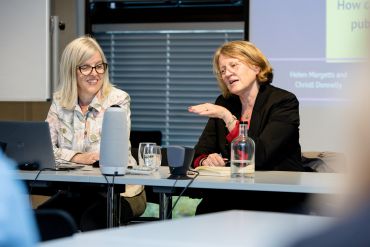
Oxford Policy Engagement Network Strategy 2025-30
 ‘The University of Oxford is committed to applying its world-leading research for public good; OPEN is key to catalysing connections and collaborations between researchers and policymakers to improve public policy and tackle local, national and global challenges.’
‘The University of Oxford is committed to applying its world-leading research for public good; OPEN is key to catalysing connections and collaborations between researchers and policymakers to improve public policy and tackle local, national and global challenges.’
Vice-Chancellor, Professor Irene Tracey CBE, FRS, FMedsci
Foreword
Jacqueline Broadhead, Chair, OPEN Steering Group, Academic Champion for Policy Engagement
 The Oxford Policy Engagement Network (OPEN) enables research and policy professionals to join forces in shaping public policy that protects what is valuable and changes the world for the better. Since its launch in 2020, the network has grown to include research professionals and students in more than 50 departments and faculties, as well as policy professionals in Oxford, across Whitehall and the UK, and around the world.
The Oxford Policy Engagement Network (OPEN) enables research and policy professionals to join forces in shaping public policy that protects what is valuable and changes the world for the better. Since its launch in 2020, the network has grown to include research professionals and students in more than 50 departments and faculties, as well as policy professionals in Oxford, across Whitehall and the UK, and around the world.
We remain committed to our original vision of public policy informed by the world’s best available research evidence and expertise. The very best research – from across the humanities, the life, mathematical, medical, physical and social sciences – helps to identify, clarify, and tackle the challenges that face us, and to seize opportunities. OPEN serves as a catalyst for this, providing opportunities and resources for research and policy professionals to learn from each other, to develop relevant skills, and to work together.
In this strategy we want to build on the strong foundations of OPEN’s first 4 years, made possible by funding from Research England. I’m grateful to all those who have helped lay these, including colleagues on the Steering Group and in the Policy Engagement Team, the research and policy professionals who have taken part in our projects and programmes, as well as those who have offered reflections and recommendations which have shaped our thinking.
This new strategy sets out OPEN’s ambitions for the next 5 years: to make better use of the expertise and insights of policy professionals; to create an environment, culture, and infrastructure across the University that supports engagement as well as it supports research, especially by lowering systemic barriers; to improve access to, and uptake of resources and opportunities; and to broaden our funding base. It also sets out the values we want to bring to implementation. Delivering on this strategy isn’t only about individual teams or researchers, vital as they are, but also about systemically creating a university environment which allows policy engagement to flourish and grow, in order that our research can be as impactful as possible.
As academic champion for policy engagement, I can see first-hand the extraordinary range of impacts that arise from effective engagement between Oxford’s researchers and policy professionals: it strengthens policy design and implementation, and improves the quality and utility of our research, without compromising our academic independence or integrity. So, please accept this strategy as an open invitation to get in touch with the Policy Engagement Team and to get involved. Key highlights from our strategy can be found below. Download the full version, including illustrated impact case studies, here.
OUR VISION
Public policy powered by the world’s best available research evidence and expertise
OUR MISSION
To enable research and policy professionals to join forces in shaping public policy that protects what is valuable and changes the world for the better
OUR VALUES
Integrity
We engage in the public interest and are committed to identifying and resolving any conflicts of interest. We aim to ensure that rigorous research of the highest quality and responsible engagement clarifies, or expands, the range of options open to policy professionals. We operate independently of any political affiliations and do not take collective positions on issues of public policy
Equity, diversity and inclusion
We recognise the importance of diversity – including that of approach, background, experience, expertise, and identity – in generating more significant policy questions, more relevant evidence, and a wider range of feasible policy options. We are committed to identifying and removing barriers to accessing opportunities and resources, and engaging in ways that are as fair and inclusive as possible.
Complementarity
We aim to recognise, complement, and add value to the activity and achievements of others at Oxford and elsewhere. We look for synergies to make the most of scarce resources (including time), and to minimise duplication of effort and inadvertent competition.
Openness and sharing
We are curious, and keen to learn from our own and others’ experience, as well as from advice and feedback. We are committed to improving our approaches to monitoring, evaluation and learning, and to sharing what we learn.
A more supportive system
Many of us are passionate advocates for specific policies or outcomes. We are nonetheless convinced that benefit – to research, policy, and practice – is more likely to come from engagement that enables co- design, collaboration and co-production.
OUR AIMS
1. To make more of policy professionals’ expertise
Many research professionals want to learn what policy professionals already know: how governments work, how they use research and other evidence, and how policy is made. Some departments at Oxford have found ways to tap into this expertise to inform institutional and individual approaches to engagement; OPEN has complemented this with initiatives such as the Peer Mentoring Scheme. There is, however, appetite and scope to do more.
By 2030 we will have
- Created new ways for policy professionals to engage with the University, and supported uptake of these.
- Improved communication of these and other opportunities.
Next steps include:
- Launching an OPEN Visiting Fellowship for policy professionals
- Establishment of a biennial OPEN Forum as a platform for research and policy professionals to explore pressing policy challenges
- Expanding the involvement of policy professionals in advising on implementation of this strategy, including allocation of OPEN funding, and in delivery of specific initiatives
- Inviting policy professionals involved in OPEN programming to join the network
- Launching a regular newsletter for policy professionals, tailored to their interests and preferences.
2. A more supportive system
We aim to create an environment, culture, and infrastructure across the University that supports engagement as well as it supports research, especially through lowering systemic barriers to engagement.
By 2030 we will have
- Improved reward and recognition of excellence in policy engagement
- Strengthened leadership and support in departments and faculties, including through creation of new roles, teams, co-ordination mechanisms and other processes
- Developed a more widely shared understanding across the University of the scope and value of policy engagement
- Made people and evidence easier to find
Next steps include
- Inclusion of policy engagement and impact in the University’s annual Recognition of Distinction exercise, the planned Academic Career & Reward Framework, and at least six academic or academic-related generic job descriptions
- Creation of a searchable online directory of OPEN members
- Mapping the supporting infrastructure for policy engagement at the University, collating examples of good practice at Oxford and elsewhere, and sharing these
- Supporting senior departmental leadership in making the most of OPEN Visiting Fellows‘ expertise.
3. Better access to opportunities and resources to learn and engage
This is fundamental to realising our vision. We have created opportunities and resources for learning and development, contributed to others, and made these and others widely available. OPEN makes it easier for us to reach beyond any ‘usual suspects’ when it comes to sharing opportunities for learning, and for engagement. Use of lotteries alongside peer review in allocating OPEN funding has contributed to greater equality of access to resources. Yet access and uptake remain patchy.
By 2030 we will have
- Simplified our internal funding processes
- Strengthened capacity in divisions and departments to lead delivery of core training
- Created more avenues for research and policy professionals to learn from each other
- Developed a framework to collect and analyse diversity data to improve access to opportunities and resources for underrepresented groups
- Improved our monitoring, evaluation, and learning.
Next steps include:
- Consolidation of tools and resources and launch of a programme to enable research professionals in divisions and departments to lead delivery of core training
- Expansion of the OPEN Peer Mentoring Scheme and evaluation of the coaching offer launched in 2024
- Reducing the number of OPEN funding schemes, increasing the regularity of calls, and making more nuanced use of lotteries in making awards
- Developing a framework for collection and analysis of diversity data, and using this to improve access for underrepresented groups
- Improving our monitoring, evaluation, and learning, and sharing more, including in an annual report.
4. A broader, more sustainable funding base
Research England’s Higher Education Innovation and Policy Support Funds have been key to the establishment of OPEN.
By 2030 we aim to have diversified our funding base, offering other funders a compelling and distinct value proposition, and a range of opportunities to support our work, especially responsible, challenge-led collaboration
Next steps include:
- Preparation and pursuit of a discrete fundraising strategy
- Creation of print and digital assets to support the strategy.
 Professor Christl Donnelly, Academic Champion for Policy Engagement (2022-24) with Professor Helen Margetts, Oxford Inside Out (2023) © Plastic Goldfish
Professor Christl Donnelly, Academic Champion for Policy Engagement (2022-24) with Professor Helen Margetts, Oxford Inside Out (2023) © Plastic GoldfishOUR IMPACT
To date, OPEN has facilitated engagement between research professionals in more than 40 departments at Oxford and policy professionals in more than 100 organisations, in and outside the UK. Find out more about our impact.